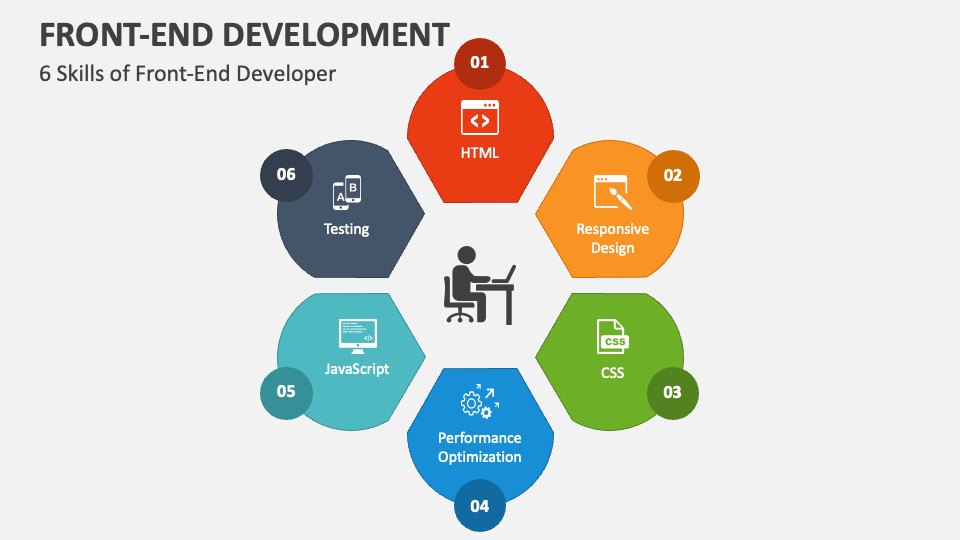The Top 6 Front-End Web Developer Skills that Will Be in Demand in 2024

In our daily lives, the websites we come through and interact with are created by front-end web developers. This might spark curiosity about the required front-end web developer skills to create something exceptional.
Let’s dive deep to understand the top skills required for frontend development that will also help you decide if you want to make your career in this field.

What is Front-End Development?
First, let’s quickly catch up on what front-end development is.
As you browse a website, you interact with different parts of the site that help you navigate it. These components are created through front-end development that includes buttons, links, and dynamic elements. The front-end of a website enables users to engage with it, perform various tasks, and view multimedia content. This includes the site’s visual design, user experience, and overall functionality, which are achieved through the use of HTML, CSS, and JavaScript.
Top 6 Front-End Web Developer Skills
1) HTML
The very first and basic language you’ll learn when starting web development is HTML. Without this basic language, you cannot build a website.
HTML, which stands for Hypertext Markup Language, is the primary language used to create web pages. It is an essential skill for frontend developers who want to build a solid foundation for their projects. With HTML, developers can easily integrate text, links, images, audio, and video content onto a webpage. Although some may argue whether HTML qualifies as a programming language, its importance in web development is undeniable. If you’re new to HTML or want to improve your skills, ToolDart is here to help you get started on your journey into web development.
2) CSS
Once you are done with the HTML code, you notice that although impressive, the website you’ve created is quite boring and unattractive.
This is where the power of Cascading Style Sheets (CSS) comes into play. CSS is a crucial coding language that breathes life into plain HTML and transforms it into stunning websites that you know and love. The beauty of CSS lies in its ability to seamlessly separate the presentation layer (CSS) from the content layer (HTML), providing a clear and concise codebase that is easy to manage and maintain.
If you want to start a career in front-end web development, you first need to become skilled in coding with HTML and CSS. The good news is that you can gain a solid working knowledge of either of these within just a few weeks. The exciting part is that HTML and CSS are the technical requirements you need to build stunning websites.
3) JavaScript
JavaScript is essential for creating interactive websites, while HTML and CSS are used to build the basic structure. Learning all three languages will increase your chances of getting developer jobs.
JS powers a wide range of sophisticated web elements like video players, real-time refreshing, in-page chat, online games, maps, and more.
It is a network-centric scripting language and is known to be rendered and lightweight.
JavaScript is the only programming language that can be used on the front end of websites, making it the most widely used programming language in the world. Most websites use JavaScript, and all modern web browsers, including those on desktops, tablets, and phones, come with built-in JavaScript interpreters, making it the most widely deployed programming language in history.

4) jQuery
JavaScript provides a range of libraries and among them, jQuery is one of the most popular. It is like a toolbox containing useful extensions and plugins that simplify working with JavaScript on websites. Learning front-end web developer skills in jQuery can be a game-changer for developers as it saves a lot of time and effort. One of the best features of jQuery is its ability to promote code reusability. Instead of writing lengthy JavaScript code repeatedly, developers can streamline their workflow by using jQuery’s straightforward syntax. It reduces complex code into simple, executable lines, making tasks more manageable. By importing jQuery libraries, developers can significantly speed up the website development process. Moreover, jQuery comes with pre-built solutions for common features like autocomplete forms and countdown timers, further simplifying the coding process.
5) Bootstrap
Bootstrap is a versatile toolbox for developers, offering a vast collection of reusable code snippets. As a Frontend-Development Framework written in HTML, CSS, and JavaScript, Bootstrap simplifies the process of building responsive websites. Its popularity originates from its ability to smoothly create mobile-friendly applications, making it a go-to choice for developers worldwide.
With Bootstrap, designers can access a plethora of design templates and components, from forms to navigation menus, all while ensuring compatibility across various devices and modern web browsers like Chrome, Firefox, Safari, and more. Whether you’re a beginner or an experienced developer, Bootstrap provides the tools needed to streamline the web development process and deliver exceptional user experiences.
6) Testing and Debugging
Testing is crucial for ensuring your project works without any errors. Front-end developers need to be able to test and fix code to keep everything running smoothly. There are different ways to test websites. Functional testing checks specific parts of your site to make sure they do what they’re supposed to do. Unit testing looks at each line of code to make sure it’s working correctly. Testing frameworks like Mocha and Jasmine help with this process. Mocha is a JavaScript framework that’s great for testing in the browser and on Node.js. It makes testing asynchronous code easy. Jasmine is another free JavaScript framework. It uses a method called Behavior Driven Development (BDD) to test every part of your JavaScript code, ensuring it works as expected. Both frameworks simplify testing, making the whole process faster and easier for developers.
Soft skills for front end developer
Apart from the technical skills, you also need to be good at various soft skills. The basic Soft skills for front end developer are as follows:-
- Communication
- Problem-Solving
- Teamwork
- Time Management
- Adaptability
- Creativity
- Critical Thinking

Conclusion
The above skills for front-end development are essential to build a captivating and functional website. Rest, the programming languages that are required depend on the project.
Hopefully, this article has given you an idea of whether you can go into this field and want to become a front-end developer or not.
But to be honest, it is a great career option that will help you grow very gracefully. So, if you are looking for the best front-end development course in Jaipur, join ToolDart.
We wish you all the best!




